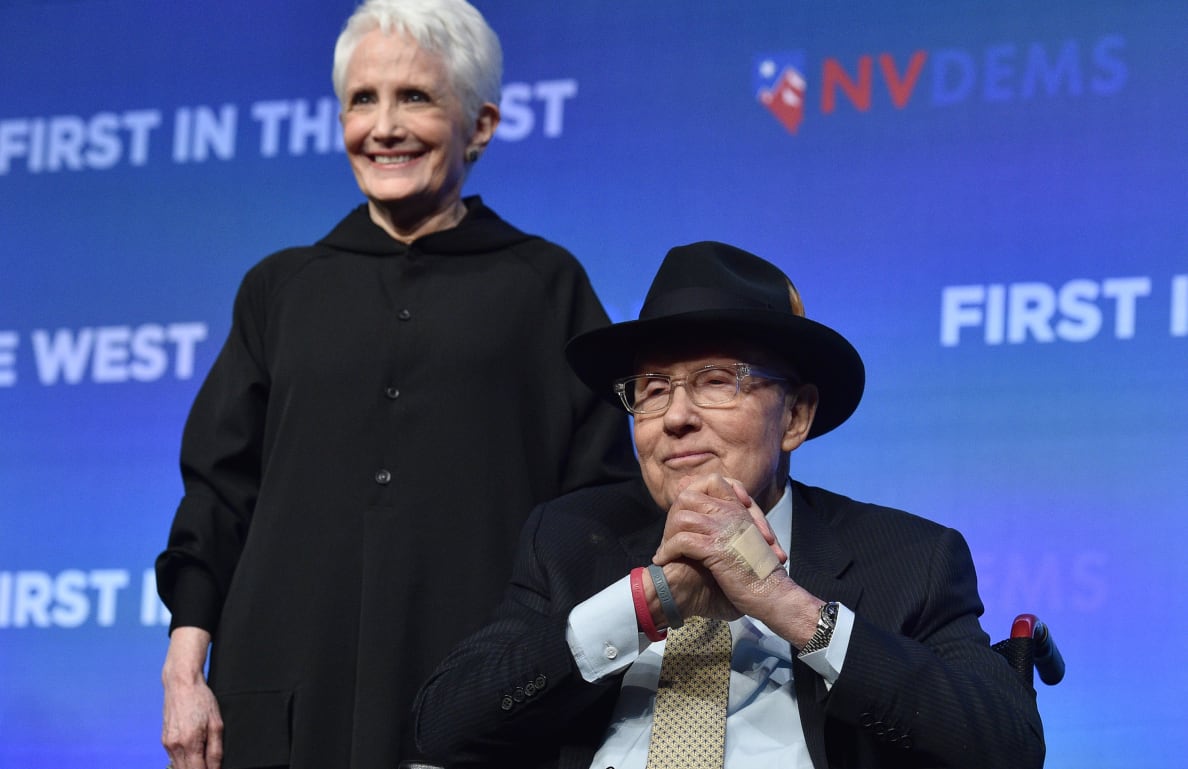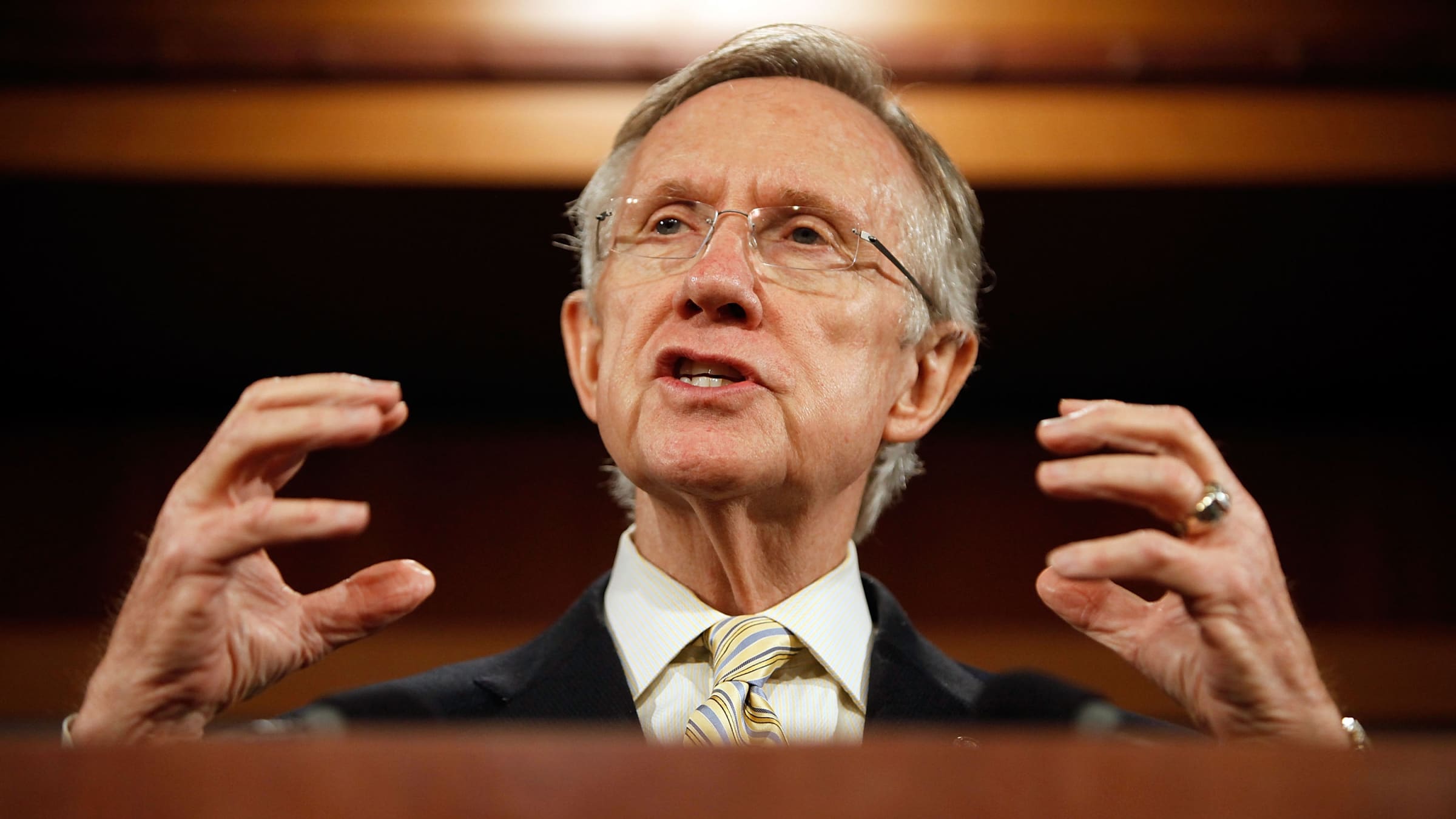Chip Somodevilla/Getty
Born in a Nevada mining town in 1939, Harry Mason Reid grew up in a house correctly described as a shack with no indoor toilet, hot water, or telephone. Years later, when he had improbably risen to become majority leader of the U.S. Senate, he published his memoir, The Good Fight: Lessons Learned From Searchlight to Washington, a nostalgic look at where he got his start in life and the people who helped him set his sights beyond that hardscrabble beginning.
John L. Smith, then a Boulder City Review columnist and a Nevada native like Reid, wrote that Searchlight’s native son had to work to wax nostalgic and find redeeming qualities in “the broken-down, brothel-infested mining burgh south of Las Vegas on U.S. Highway 93. When the local whore master, Willie Martello, is seen as a positive influence on the local populace in part because he lets the kids swim in the El Rey Motel pool, you know you’re in rough country.”
In his memoir, Reid credits a grade-school teacher, Mrs. Pickard, with igniting a spark for learning that he didn’t even know he had. “I can’t remember one thing she taught me, not one,” Reid wrote. “But she was the first person to teach me that it was good to learn, she was the first person who instilled in me the desire to read.”
There was no high school in Searchlight, so Reid stayed with relatives 40 miles away in Henderson, Nevada, so he could attend Basic High School. Yes, that was its name. It was there he met civics teacher Mike O’Callahan, a Korean War veteran and future governor of Nevada. Callahan doubled as the school’s boxing coach and introduced Reid to the Henderson boys’ club. “It was a dive, it should have been condemned, but they had a ring. I always loved the sport of boxing,” Reid recalled after he was inducted to the Nevada Boxing Hall of Fame in August 2018.
Photos of boxing greats line a wall at his home in Henderson and joining their ranks, even if only in a museum, meant a lot to Reid, who three months earlier, in May 2018, had undergone surgery to remove a cancerous tumor from his pancreas. Reid was characteristically unflinching about his diagnosis, telling The New York Times magazine in early December 2018, “As soon as you discover you have something on your pancreas, you’re dead.”

Harry Reid and his wife, Landra, acknowledge the audience during the Nevada Democrats’ “First in the West” event at Bellagio Resort & Casino on Nov. 17, 2019, in Las Vegas.
David Becker/Getty
Reid survived for another three years, passing away on Dec. 28, 2021.
“He was one of the major legislative figures of the last half century,” says Jonah Blank, a former longtime staffer on the Senate Foreign Relations committee. “He knew the process, he was tough, he got things done. He’s a figure Democrats and all Americans should be proud of.”
Republicans might not share the entirety of that assessment. They were outraged in 2012 when Reid went to the Senate floor and claimed that he had it on good authority the Republican presidential candidate, Mitt Romney, had not paid taxes in the past decade. Romney released his taxes soon after, proving Reid wrong. Challenged by CNN, Reid responded, “Romney didn’t win, did he?”
Asked about the incident, Reid told Marc Leibovich, writing for The New York Times magazine, “I was always willing to do things that others were not willing to do.” That was the case in 2014 when Reid, with majority support in the Democratic caucus, eliminated the 60-vote threshold for executive appointments and judges, except for the Supreme Court. He got plenty of criticism from Democrats and Republicans alike who worried that this partisan change in the rules would undermine a Senate tradition of bipartisanship and overextend executive authority for whichever side or ideology is in power.
“God bless Harry Reid for breaking the dam, and starting us down this path,” says Republican strategist Scott Jennings, who is no fan of Reid’s. By invoking what both sides call “the nuclear option” in striking the 60-vote requirement, Republicans say Reid made it inevitable that once the GOP got in power, they would further change the rules to benefit themselves. With President Trump in the Oval Office and Republicans controlling the Senate, GOP leader Mitch McConnell struck down the 60-vote filibuster-proof requirement for the Supreme Court. Justices Gorsuch, Kavanaugh, and Barrett were confirmed with significantly fewer votes than 60 (54 for Gorsuch; 50 for Kavanaugh; 52 for Barrett).
“They can say what they want,” Harry Reid said of his critics, explaining in the Times magazine interview, “We had over 100 judges that we couldn’t get approved, so I had no choice. Either Obama’s presidency would be a joke or Obama’s presidency would be one of fruition.”
Reid helped shepherd through Obama’s signature legislation, the Affordable Care Act, a significant accomplishment because of Republican opposition. The bill did not receive a single Republican vote. It passed the Senate in 2009 with 58 Democratic votes and 2 independent votes. Obama signed it into law in 2010, sparking what became known as the Tea Party backlash.
Reid was a bare-knuckle brawler when it came to politics. “He was exceptionally competent at delivering the vote,” recalls Jonah Blank, who credited the “Reid machine” with electing Democrats in Nevada and for rescuing his own candidacy when he appeared doomed in 2010 running for a fifth term against Republican Sharron Angle. The website Real Clear Politics observed that if Reid were a cat, he’d be on his 15th life. His luck held. The website noted that Angle was running as a “proud Christian conservative in Sin City,” and that she was proving herself “chronically gaffe prone.” The combination allowed Reid to win a race everyone expected him to lose.
It was a fitting capstone on a career that no one would have predicted. He went to college in Utah, where, after being raised as an agnostic, he converted to the Church of the Latter-day Saints. He got his law degree from George Washington University while working as an officer for the U.S. Capitol Police. He eloped at age 20 with his 19-year-old high-school girlfriend, Landra Gould, who also became a Mormon. Her Jewish parents had tried to break up the couple, and Landra in 2009 told the Forward, a periodical focused on the Jewish community, that she remembered “a lot of yelling and pushing” between Reid and her father that ended, in Reid’s telling, when he knocked her father, a chiropractor, to the ground.
After the marriage was official, the parents relented, and Reid told The New Yorker that all five of his children are proud of the fact that they are eligible for Israeli citizenship.
Reid returned to Nevada after getting his law degree, and his former boxing coach, Mike O’Callahan, who was running for governor, chose Reid as his running mate in the 1970 election. After four years as lieutenant governor, Reid ran unsuccessfully for the U.S. Senate and then for mayor of Las Vegas. Appointed by O’Callahan, he chaired the Nevada Gaming Commission for five years in the late ’70s, the heyday of organized crime. He is remembered for his efforts to impose regulation on some of the celebrated mob figures controlling Las Vegas casinos at the time.
He is featured in a video at the Mob Museum in Las Vegas (aka the National Museum of Organized Crime and Law Enforcement), where the director of content, Geoff Schumacher, told KNPR in 2016 that the experience gave Reid “a thick skin, if he didn’t have one already.” Threats against Reid and his family were an everyday occurrence, and he had devices installed on his car to detect bombs. Reid’s experience is chronicled in Nicholas Pileggi’s 2011 book Casino and in the Martin Scorcese film of the same name.
It wasn’t until 1982 that Reid won a House seat, which he followed with a successful bid for the U.S. Senate four years later, in 1986. His inside-baseball strategic sense and his hardball tactics moved him up the leadership ladder. When the Democrats took back the Senate in 2006, he became Senate majority leader in January 2007, a post he held until January 2015, when Republicans regained the majority.
That same January, Reid fell in his home in an accident attributed to a faulty treadmill. He suffered significant injuries, including broken ribs and facial bones, and had to undergo surgery to repair the facial bones and remove a blood clot from his right eye. In late March 2016, he announced that he would not seek a sixth term, explaining he did not want precious resources spent during a presidential election year on what would be another tough fight for him. He endorsed New York Sen. Chuck Schumer, an ally for 30 years, to succeed him as Democratic leader.
In his last months in office, Reid made public letters he had written to FBI Director James Comey on Aug. 29 and again on Oct. 30, 2016 demanding to know why the Bureau had not made public the investigation that had been opened into Donald Trump and his campaign’s possible collusion with Russia. Reid’s entreaties were dismissed, and in an interview with CNN in late February 2019 at his office in the Bellagio Hotel in Las Vegas, Reid said the Democratic candidates running for president “need not talk about how bad President Trump is, they just need to talk about what’s good for the country.”

